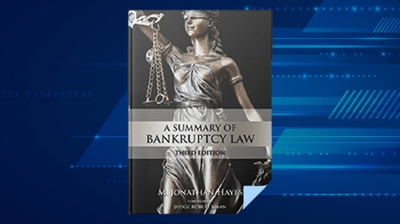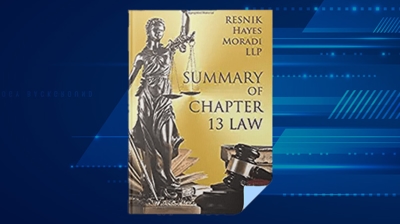
Los Angeles Bankruptcy and Family Law Attorneys
Filing Bankruptcy After a Divorce in California
Financial problems often go hand in hand with family law issues. Not having enough money can create a strain in your marriage or cause problems with a child support claim. Further, after couples divorce, it can be difficult to adjust to living on one income if you have been used to dealing with two. Not surprisingly, bankruptcy is a common theme in family law matters.
If you are facing overwhelming debt and want to regain control of your finances, talk to our bankruptcy attorneys in Los Angeles. RHM LAW LLP has helped thousands of individuals in the Los Angeles area take the first steps toward financial recovery.
During a 30-minute complimentary consultation, we will discuss your situation and advise you on whether bankruptcy suits your needs. Call (213) 344-0043 now.
California Bankruptcy Lawyers Providing Trusted Guidance
When bankruptcy and divorce or another family law issue occur at the same time, the intersection of the laws in each area creates a number of questions, such as:
- Can my spouse and I jointly file for bankruptcy while we are going through a divorce?
- How are joint debts separated if I file for bankruptcy and my spouse does not?
- If I file for bankruptcy, do I still need to pay child support?
- Are spousal support obligations discharged in bankruptcy?
- What happens if I lose my job while I am in Chapter 13 bankruptcy?
- My home is facing foreclosure. Will we lose our equity in our divorce?
For these and other questions, it is important that you get solid answers from someone who knows bankruptcy inside and out. At RHM LAW LLP, we understand all aspects of Chapter 7 bankruptcy and Chapter 13 bankruptcy. We welcome the opportunity to meet with you and discuss your particular situation.
If financial distress is causing arguments, there is a solution to your financial hardship! Chapter 7 or Chapter 13 bankruptcy could give you a fresh start, save your house, your car, and, potentially, your marriage.
The Impact of Bankruptcy on Child Custody and Visitation
Filing for bankruptcy can influence decisions related to child custody and visitation, though indirectly. Courts prioritize the best interests of the children in custody matters, but financial stability is an important factor in these decisions.
- Financial Impact on Custody Arrangements: If a parent files for bankruptcy, it may affect their ability to provide for the child’s needs. This could influence custody arrangements or parenting time.
- Impact on Visitation: Bankruptcy itself won’t directly change visitation schedules. However, if financial issues lead to non-payment of child support or other responsibilities, it could result in legal consequences, potentially affecting visitation rights.
- Debt and Parenting Stability: A parent struggling with debt might face challenges in providing a stable home environment, which courts consider when making custody decisions.
Protecting Your Assets in Divorce and Bankruptcy
When facing both divorce and bankruptcy, protecting your assets is essential. Both situations can put your savings and property at risk, but there are strategies to safeguard valuable assets.
- Retirement Funds: Certain retirement accounts, like 401(k)s and IRAs, are often protected from bankruptcy claims. However, these funds may be considered in divorce proceedings and could be divided as part of the settlement.
- Family Heirlooms and Personal Property: It’s important to document and provide proof of ownership for family heirlooms or sentimental items. While some assets can be protected, they may still be subject to division in divorce.
- Homestead Exemption: In some states, the home may be protected under a homestead exemption. This can help safeguard your primary residence during bankruptcy and divorce, but exemptions vary by state.
How Bankruptcy Affects Alimony/Spousal Support Payments
Bankruptcy can have a significant effect on spousal support obligations, depending on the type of bankruptcy filed.
- Chapter 7 Bankruptcy: Generally, alimony or spousal support payments cannot be discharged in Chapter 7 bankruptcy. This means that the obligation to pay these amounts continues even after the bankruptcy is filed.
- Chapter 13 Bankruptcy: Chapter 13 may allow for restructuring payments, but alimony and spousal support are still considered priority debts that must be paid. In some cases, a modified payment plan could reduce the amount paid each month.
Debt Discharge and the Role of Property Division in Divorce

RHM LAW LLP
Meet Our Los Angeles Bankruptcy Specialists
-
 M. Jonathan Hayes Senior Counsel
M. Jonathan Hayes Senior Counsel -
 Matt D. Resnik | Partner Partner
Matt D. Resnik | Partner Partner -
 Roksana D. Moradi-Brovia | Partner Partner
Roksana D. Moradi-Brovia | Partner Partner -
 Russell J. Stong III | Associate Attorney Senior Associate Attorney, Los Angeles Office
Russell J. Stong III | Associate Attorney Senior Associate Attorney, Los Angeles Office -
 W. Sloan Youkstetter | Associate Attorney Senior Associate Attorney, Los Angeles Office
W. Sloan Youkstetter | Associate Attorney Senior Associate Attorney, Los Angeles Office -
 David M. Kritzer Senior Associate Attorney, Encino Office
David M. Kritzer Senior Associate Attorney, Encino Office

Client Reviews
What Clients Say About Working With Us
-
"I filed bankruptcy with this firm 3 years ago and found that they are professional, friendly, and compassionate."I filed bankruptcy with this firm 3 years ago and found that they are professional, friendly, and compassionate. I also met with their loan modification department. Unfortunately, they were unable to help because of the type of loan that I have. I really appreciated that they did not lie, waste my time, or take my money in an attempt to modify a loan that was not doable. I've since used their firm for a couple of minor issues and found all of the attorneys to be knowledgeable and considerate. Attorneys Simon and Resnik are amazing!- Shannon J.
-
"Without the support of pro bono attorneys we couldn't do all the work we need to do, and your firm in particular is outstanding."
Thank you for your great work on behalf of Ms. Johnson. Without the support of pro bono attorneys we couldn't do all the work we need to do, and your firm in particular is outstanding.
- Skip K. -
"These are top-notch pros that'll have your back. I cannot recommend them highly enough."Where to begin? I had a vile evil credit union repo my car over a misunderstanding, they wouldn't work with me even when I offered full payment plus repo fees (this was my first repo!) so I didn't know what to do. I met with a few lawyers but when I met with Simon he broke things down and gave me my options. I needed a car - so I filed BK and included the car to get it back. The evil credit union fought and Simon GOT ME MY CAR BACK!!! His team is amazing!!!! Maria Donna etc!!! These are top-notch pros that'll have your back. I cannot recommend them highly enough. Sincerely they saved my life. LA with no car!? ARGH!!!!!! *THANX ALL!!!!- Tim C.
-
"I cannot thank them enough for helping save my home. I would recommend them for anyone that is thinking about filing for bankruptcy or foreclosure on their home."I needed a bankruptcy attorney in Sherman Oaks and found Matt Resnik on Google. He has one of the best-reviewed bankruptcy law firms on Yelp so I decided to check it out his law firm for myself. I quickly found out that they are foreclosure specialists and they could help me with my issue. They made the process very easy for me and laid out my options for me. I cannot thank them enough for helping save my home. I would recommend them for anyone that is thinking about filing for bankruptcy or foreclosure on their home. They are the best bankruptcy law firm in Sherman Oaks.- Joseph R.
-
"Matt and his staff conducted themselves with professionalism throughout the whole ordeal."I worked with Matt and his team for about a year to get through the paperwork shuffle and my personal experience was nothing short of fantastic. Legal situations have a tendency to get hairy, but Matt and his staff conducted themselves with professionalism throughout the whole ordeal. To keep it short, let's just say he under-promised and over-delivered. Rarely would I ever say this about an attorney, but overall he was just a great guy. I would not hesitate to have him on my side of the courtroom again. World market is right across the street from his office and I even decided to get his staff a thank you / holiday gift card. World market has excellent craft beer BTW, try the Einstock White Ale. They also validate parking. That just shows this isn't a fake review.- Dean C.
-
"They were thorough, extremely knowledgeable, wonderful to deal with, thoughtful, and really helped guide me through what was one of the toughest times in my life."Matt and his team are the best!! They were thorough, extremely knowledgeable, wonderful to deal with, thoughtful, and really helped guide me through what was one of the toughest times in my life. I never felt judged or looked down on. They were efficient and really were lifesavers during this tough time. I can not recommend them highly enough!!!!- Rusty H.
-
"He negotiated on my behalf with a credit card company and was able to settle with them for much lower than I could have on my own."I worked with David Kritzer at this firm, and he was great. He negotiated on my behalf with a credit card company and was able to settle with them for much lower than I could have on my own thanks to his knowledge and expertise in the field. If you have a debtor on your back go to him to get it taken care of.- Kelly S.
-
"He made me feel like I had options, all was not lost, and I could rebuild my credit."Matt is the best bankruptcy attorney in Sherman Oaks. I consulted with Matt over a chapter 7 bankruptcy. I had issues with overwhelming credit card debt after Chase increased it's APR for no reason. It set off a chain of events that were really hurting me. He made me feel like I had options, all was not lost, and I could rebuild my credit after the 7. I had some concerns about a piece of property I was having issues with and Matt also turned out to be a real estate lawyer as well! I recommend this office to anyone who is unsure of their financial situation. It doesn't hurt to find out your options.- Max B.
-
"As the dank blanket of economic uncertainty continues to depress the hopes of many of us, I keep your business cards and number available for others."This is to thank you for the exceptional work of you and your fine staff. In managing my bankruptcy and loan modification, a nearly five-year effort, your performance was stellar. I never felt alone or adrift, key concerns in those circumstances. The outcome was outstanding. As the dank blanket of economic uncertainty continues to depress the hopes of many of us, I keep your business cards and number available for others. Without hyperbole, I can attest that you are present a beacon. Thank you so much.- K.C.

-
 A Summary of Bankruptcy Law: Third Edition
A Summary of Bankruptcy Law: Third Edition -
 Summary of Chapter 13
Summary of Chapter 13







